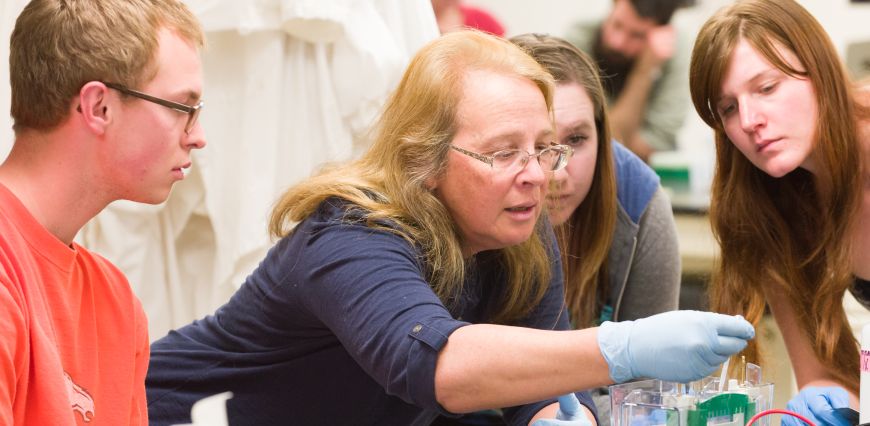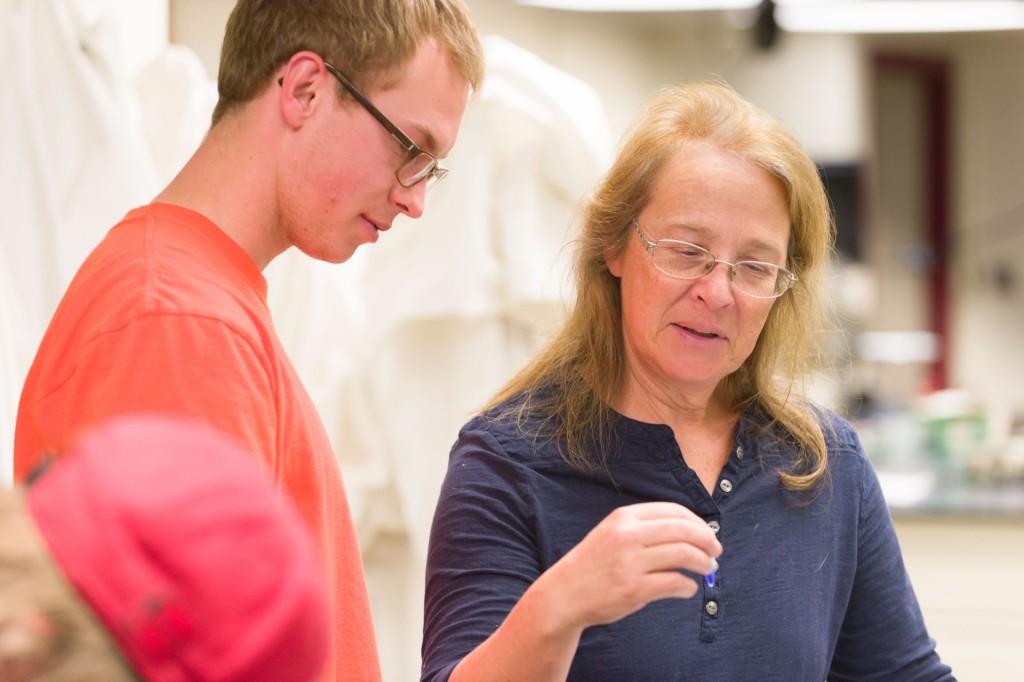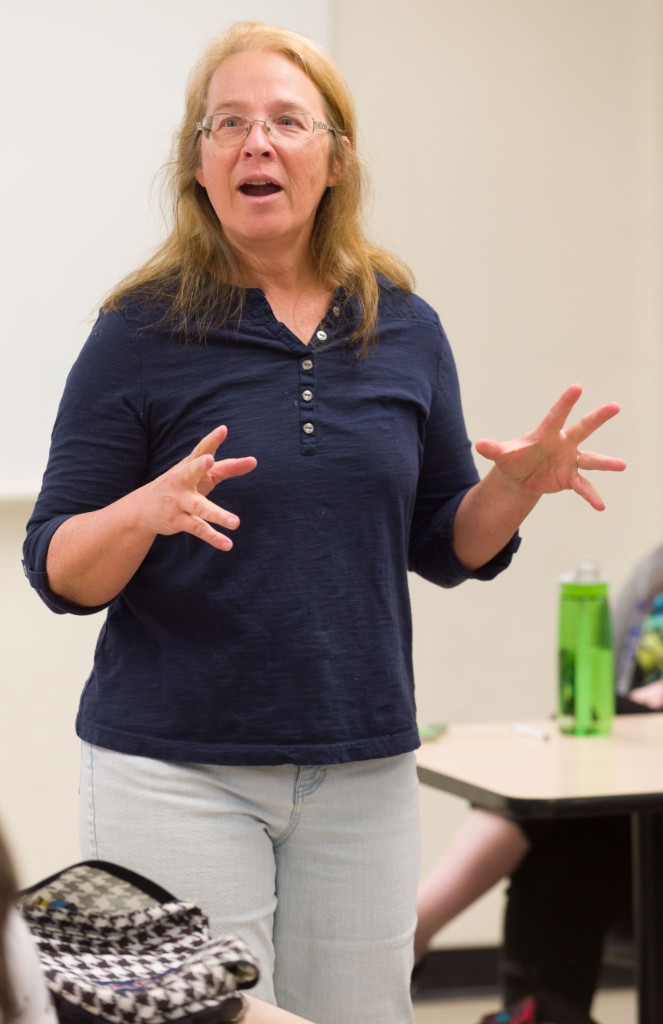
Colorado State University asked, students selected, and this year, an associate professor from the College of Veterinary Medicine and Biomedical Sciences, Dr. Marie Legare, was named a 2015 Best Teacher Award recipient.
A faculty member in the Center for Environmental Medicine, Legare teaches toxicology courses for both graduate and undergraduate students. She shares this year’s distinction with five additional professors across campus, including educators from the colleges of Liberal Arts and Health and Human Sciences.
Students nominate faculty members, and the Colorado State Alumni Association honors outstanding CSU educators each year with Best Teacher Awards. This year’s recipients were recognized at a dinner on April 20 at the Lory Student Center Theatre.
“I am so honored to receive this award. My students are my second family. I do a little dance of joy when they get into their careers or professional medical programs, and I am there whenever they need a little help,” Legare said. “They are like my kids, but thank goodness I don’t have to teach them to drive!”
The following Q&A will expose readers to Legare and her teaching.
Q: What drew you to teaching?
 A: During my master’s preliminary, I had to complete an oral exam. Being the extreme introvert I am, I started hyperventilating mid-presentation to the point of having to breathe into a paper bag. Luckily, I was given another opportunity, and I made it through the second oral exam. From then on, every time we were asked to write a paper, my professors required me to give an oral presentation. To fund my education, I was required to lecture as a teaching assistant. Lecturing became easier every day, and I found that I really enjoyed the interaction with the students. Helping that one student reach his or her “a-ha” moment, where they finally understand a concept, that’s what makes it all worth it. That’s when I know I have done my job.
A: During my master’s preliminary, I had to complete an oral exam. Being the extreme introvert I am, I started hyperventilating mid-presentation to the point of having to breathe into a paper bag. Luckily, I was given another opportunity, and I made it through the second oral exam. From then on, every time we were asked to write a paper, my professors required me to give an oral presentation. To fund my education, I was required to lecture as a teaching assistant. Lecturing became easier every day, and I found that I really enjoyed the interaction with the students. Helping that one student reach his or her “a-ha” moment, where they finally understand a concept, that’s what makes it all worth it. That’s when I know I have done my job.
Q: What has been your favorite class or lecture to teach?
A: I teach all ages, from preschool to the graduate level, and I truly enjoy every class. I especially love 8- to 10-year-old students. They are so excited and interested in everything. I also love senior undergraduate and graduate students. They have such focus and direction; it makes teaching easy.
Q: How would you describe your teaching style?
A: My students tell me they enjoy my classes because they feel like I actually have conversations with them, rather than standing behind a podium. I try to integrate real-life examples into what I teach, and challenge students to apply what they have learned in class to those real examples. I try to incorporate a discussion-based — and almost Socratic — style into my lectures.
Q: What do you do in your free time?
A: I’m naturally an introvert, which might come as a surprise since I have spent 15 years teaching. Life is all about balance to me. I teach all day, and then go home to recharge by playing the piano and cello, quilting, painting murals, gardening and reading.
Q: So, you enjoy both science and art?
A: To me, science is art. Science really is all about colors, shape and flow, just like art. If you look at a cell under a microscope, it can look just like stained glass, like art.
Q: What is the most toxic substance you have encountered and what was the source?
 A: Botulinum – it is the most toxic substance known. It might occur when someone cans food improperly, causing the pH levels to become off-balance. Toxins produced by the bacteria in the can create botulinum toxin.
A: Botulinum – it is the most toxic substance known. It might occur when someone cans food improperly, causing the pH levels to become off-balance. Toxins produced by the bacteria in the can create botulinum toxin.
Q: How do you keep your lectures current?
A: I find toxicology stories in the news and discuss them with my students. For example, last year, a new wasp species, the “dementor” wasp – named after the soul-sucking dementors in “Harry Potter” books – was discovered. The wasps inject a neurotoxin into their prey, cockroaches. The toxin turns the roaches into veritable zombies, and the cockroaches physically follow the wasps back to their main nest, where they are consumed. It’s fascinating, and little is yet known about the type of toxin the wasp uses.
Q: What advice do you have for students who take one of your classes?
A: Get involved. Everyone learns more if there is a great discussion happening. Don’t be afraid to ask or answer a question in class. Amazing things can happen when everyone is involved. And for all students: Don’t be afraid to approach faculty. We want to teach, to help. If you never reach out and take control of your education, then you won’t get what you want from it.
Toxicology at CSU
The Master of Science in Toxicology professional program in CSU’s Department of Environmental and Radiological Health Sciences provides education regarding adverse effects of chemical, physical or biological agents on living organisms and the ecosystem. Our researchers explore strategies to prevent and improve those effects.
Students in the graduate toxicology program are prepared for medical, veterinary, pharmacology and other professional programs. They find careers in forensic science, environmental health, infectious disease, veterinary science, and more. Learn more about the toxicology program here.
Previous recipients
Previous Best Teacher Award recipients from the College of Veterinary Medicine and Biomedical Sciences include:
- 1997, Dwight Bennett, veterinary medicine
- 1998, Mark Frasier, human anatomy
- 2002, Erica Suchman, microbiology
- 2008, John Walrond, human physiology
Quick Facts About Marie Legare
Name: Dr. Marie Legare
Title: Associate Professor, Center for Environmental Medicine, Department of Environmental and Radiological Health Sciences
Education: B.S., 1979, M.S., 1983, Montana State University; D.V.M., 1991, Ph.D., 1995, Texas A&M University
At Colorado State University: 15 years
Has taught: toxicological pathology, industrial and occupational toxicology, environmental toxicology, cell and molecular toxicology techniques, environmental health field methods, veterinary toxicology
Previous honors: 2013-14 Award for Innovative Instructional Methodology in Graduate Education; 2008 Outstanding Academic Advising in Graduate Education; 2007 Outstanding Mentor Award for Undergraduate Students; 2006 Outstanding Undergraduate Professor Award
Family: Married to fellow faculty member William Hanneman, one 17-year-old daughter
Hobbies: playing cello, reading science fiction and fantasy, quilting and gardening
.